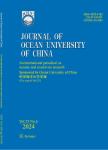Kelp Fucoidans Facilitate Vascular Recanalization via Inhibiting Excessive Activation of Platelet in Deep Venous Thrombosis Model of Mouse
作者机构:Department of Clinical Drug TrialsQingdao Municipal HospitalQingdao 266100China Department of PharmacyQingdao Municipal HospitalQingdao 266100China
出 版 物:《Journal of Ocean University of China》 (中国海洋大学学报(英文版))
年 卷 期:2024年第23卷第2期
页 面:550-556页
核心收录:
学科分类:1008[医学-中药学(可授医学、理学学位)] 1006[医学-中西医结合] 100602[医学-中西医结合临床] 10[医学]
主 题:kelp fucoidans LF1 LF2 deep vein thrombosis platelet
摘 要:This study was carried out explore the mechanism underlying the inhibition of platelet activation by kelp fucoidans in deep venous thrombosis(DVT)*** the control and sham mice,the walls of deep vein were regular and smooth with intact intima,myometrium and *** blood vessel was wrapped with the tissue and there was no thrombosis in the *** the DVT model,the wall was uneven with thicken intima,myometrium and *** treated with fucoidans LF1 and LF2,the thrombus was dissolved and the blood vessel was *** with the control group,the ROS content,ET-1 and VWF content and the expression of PKC-βand NF-κB in the model were significantly higher(P0.05);these levels were significantly reduced following treatments with LF2 and *** with H_(2)O_(2)treated-HUVECs,combined LF1 and LF2 treatment resulted in significant decrease in the expression of PKC-β,NF-κB,VWF and TM protein(P0.05).It is clear that LF1 and LF2 reduces DVT-induced ET-1,VWF and TM expressions and production of ROS,thus inhibiting the activation of PKC-β/NF-κB signal pathway and the activation of coagulation system and ultimately reducing the formation of venous thrombus.



